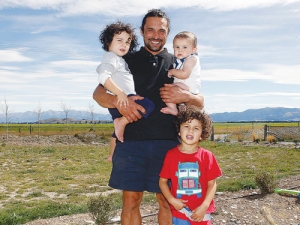NZ-designed testing method unlocks healthy soil
A study arising from a partnership with Ravensdown, AgResearch and Ngāi Tahu Farming, has created a benchmark approach to testing the health of soils.
 Ngai Tahu Farming’s Hemi Dawson, pictured here with his three sons, says it’s all for the next generation.
Ngai Tahu Farming’s Hemi Dawson, pictured here with his three sons, says it’s all for the next generation.
Hemi Dawson says Ngai Tahu Farming have to set the standard everyone aspires to because their mana is at stake.
He says Maori have to be the strongest voice for the environment; Ngai Tahu Farming must not contribute to the degradation of waterways. He believes this will change the general population's perception of farming and then they can engage the population so they can be part of the process.
On each farm there is a mana whenua working party involved in governance and they hold you accountable, Dawson said. This imposes stricter guidelines for Dawson than on many other farms.
Health and safety are prominent: all staff must wear hi-vis vests and everyday there is a start-up health and safety meeting on each farm.
The hapu also put conditions on how the farms operate; for instance, no palm kernel extract, no dead-cow holes, water use must be optimised and each farm must forge sustainability.
Dawson describes himself as an instinctive farmer; he keeps his eyes open and makes sure he has his finger on the pulse of his farm.
He manages 250 effective ha and milks 900 cows. His initiatives on the farm include planting 21,000 native trees and he has cut nitrogen use 100 units lower than the hapu stipulated.
Every dollar not spent adds to the bottom line, so Dawson tries to make the best of money spent. He says the requirement to satisfy iwi expectations is more of a challenge than would rise in a regional council because their fiercest critics come from within the tribe.
Rod Lamb joined Ngai Tahu Farming in July 2015 when the farm was fairly new, with 350 effective ha and 1050 cows. Lamb is not your normal farm manager: he had played a corporate 'game' before and run multiple farms. He joined Ngai Tahu Farming because it was the same, but different.
He enjoys being a mentor more than a manager; he doesn't put himself out there, and instead will push one of his workers out in front to challenge him. He enjoys passing on knowledge, making them learn and getting the staff to tell him what they are doing on the farm.
He is heavily involved in the Whenua Kura programme Ngai Tahu has set up as an agricultural school. The iwi recently bought the nearby Eyrewell lodge to house students.
Additional tariffs introduced by the Chinese Government last month on beef imports should favour New Zealand farmers and exporters.
Primary sector leaders have praised the government and its officials for putting the Indian free trade deal together in just nine months.
Primary sector leaders have welcomed the announcement of a Free Trade Agreement (FTA) between India and New Zealand.
Dairy farmers are still in a good place despite volatile global milk prices.
Legal controls on the movement of fruits and vegetables are now in place in Auckland’s Mt Roskill suburb, says Biosecurity New Zealand Commissioner North Mike Inglis.
Arable growers worried that some weeds in their crops may have developed herbicide resistance can now get the suspected plants tested for free.

OPINION: When he promised an Indian FTA in his first term, Prime Minister Christopher Luxon was really putting it all…
OPINION: MPI's response to the yellow-legged hornet has received a mixed report card from New Zealand Beekeeping Inc (NZBI), with…